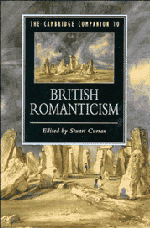Book contents
- Frontmatter
- 1 Romanticism, criticism and theory
- 2 Romanticism and Enlightenment
- 3 Poetry in an age of revolution
- 4 German Romantic Idealism
- 5 Romanticism and language
- 6 Culture's medium
- 7 Romantic Hellenism
- 8 Women readers, women writers
- 9 Romantic fiction
- 10 Romantic poetry
- 11 The sister arts in British Romanticism
- Chronology
- Bibliography
- Index
4 - German Romantic Idealism
Published online by Cambridge University Press: 28 May 2006
- Frontmatter
- 1 Romanticism, criticism and theory
- 2 Romanticism and Enlightenment
- 3 Poetry in an age of revolution
- 4 German Romantic Idealism
- 5 Romanticism and language
- 6 Culture's medium
- 7 Romantic Hellenism
- 8 Women readers, women writers
- 9 Romantic fiction
- 10 Romantic poetry
- 11 The sister arts in British Romanticism
- Chronology
- Bibliography
- Index
Summary
Im Anfang war die Tat! (In the beginning was the act.)
Faust IDie Weltgeschichte ist das Weltgericht. (World history is the Last Judgment.)
SchillerWhen the elegant exercises of Hume's skeptical empiricism woke Kant from the dogmatic slumbers of his continental rationalism, surely no one could have predicted the prodigious symphonies of German Transcendental Idealism to follow. Not, of course, that these were composed by Kant himself, but his “Copernican revolution” in epistemology prepared the way for them, as surely as the German compositions of the later Mozart prepared the way for Beethoven and Brahms - and, eventually, for the monstrous syntheses of Wagner. David Hume's secure place in the history of philosophy rests not on the construction of any philosophical system: quite simply, his essays constitute the most thorough job of deconstruction in modern intellectual history. (It is a pity, attributable, perhaps, to the French origins of the critical school - in French tradition, Locke has always been respected, Hume ignored - that modern deconstructionists have so neglected Hume, There are so many lessons available there, not only in the elegant simplicity of his arguments, but in the admirable lucidity of his Enlightenment prose.)
- Type
- Chapter
- Information
- The Cambridge Companion to British Romanticism , pp. 74 - 94Publisher: Cambridge University PressPrint publication year: 1993
- 2
- Cited by

